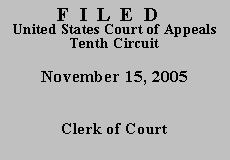

| UNITED STATES OF AMERICA, |
|
The district court sentenced Mr. Garcia to 46 months, with five years of supervised release. In imposing the minimum term specified by the Guidelines, the district court expressly stated that it was treating the Guidelines as advisory and sentence was imposed after consideration of the factors contained in 18 U.S.C. § 3553(a). II R. 7; see United States v. Booker, 125 S. Ct. 738, 765 (2005). In his opening brief, Mr. Garcia argued that the sentence was excessive and constituted plain error because the court applied the Guidelines in a mandatory fashion. Aplt. Br. at 3-6. The government responded, pointing out that the court applied the Guidelines in an advisory fashion. In reply, Mr. Garcia's counsel submitted a brief pursuant to Anders v. California, 386 U.S. 738 (1967), conceding the points argued in the opening brief. Aplt. Reply Br. at 1-2. Mr. Garcia's counsel sent Mr. Garcia the briefs and a letter outlining her position. She advised him that he had 30 days to address the court of appeals with any error he deemed to have merit. Counsel also sought to withdraw. See 10th Cir. R. 46.4(B). Apparently in response to notice, Mr. Garcia requested an extension of time to file a response to the Anders reply brief, and the court extended the deadline until August 8, 2005. Mr. Garcia has not responded. Our jurisdiction arises under 28 U.S.C. 1291 and 18 U.S.C. § 3742(a).
Mr. Garcia raised no objection regarding sentencing and as such, we review for plain error. See United States v. Gonzalez-Huerta, 403 F.3d 727, 732 (10th Cir. 2005) (en banc). The court sentenced Mr. Garcia at the bottom of the Guideline range on stipulated facts where the court treated the Guidelines as advisory and counsel conceded that the sentence was reasonable. II R. at 3. Under such circumstances, no colorable argument can be made that the district court treated the Guidelines as mandatory or the sentence is unreasonable against a backdrop of the § 3553(a) factors.
Accordingly, we DISMISS this appeal as frivolous and GRANT counsel's motion to withdraw.
Entered for the Court
Paul J. Kelly, Jr.
Circuit Judge
*. This order and judgment is not binding precedent, except under the doctrines of law of the case, res judicata, and collateral estoppel. This court generally disfavors the citation of orders and judgments; nevertheless, an order and judgment may be cited under the terms and conditions of 10th Cir. R. 36.3.
2. After examining the briefs and the appellate record, this three-judge panel has determined unanimously that oral argument would not be of material assistance in the determination of this appeal. See Fed. R. App. P. 34(a); 10th Cir. R. 34.1(G). The cause is therefore ordered submitted without oral argument.